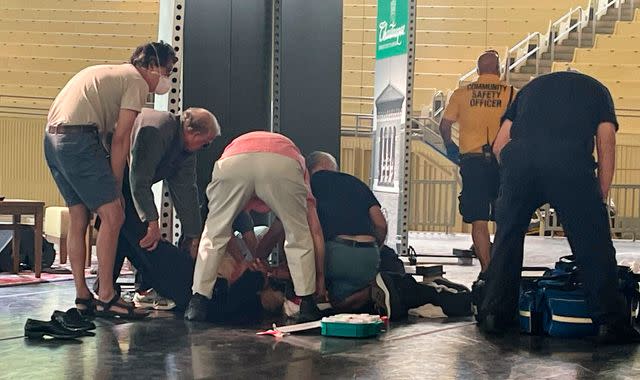Sir Salman Rushdie: Satanic Verses author stabbed in neck and abdomen at event in New York

Author Sir Salman Rushdie, who has faced death threats for his novel The Satanic Verses, has been stabbed at least once in the neck and once in the abdomen while on stage at an event in New York state.
The Indian-born British author has been airlifted to hospital but his condition is not yet known. He is still undergoing surgery.
The 75-year-old was about to give a lecture when a man stormed the stage at the Chautauqua Institution and began attacking Sir Salman as he was being introduced to the audience, according to witnesses.
The novelist fell to the floor after being attacked by the suspect, who was then pinned down by audience members and staff members who ran on stage. The suspect was arrested by a state trooper soon after and he is now in custody.
He has been identified as 24-year-old Hadi Matar from Fairview, New Jersey, who bought a pass for the event. Police say they do not yet know a motive for the assault but they believe he was acting alone.
Witness Pilar Pintagro told Sky News: "We were very scared because the first place (he was stabbed) was in the neck and that's where the blood started to splash everywhere, and then he stabbed him in the shoulders and continued stabbing several times because it was so fast.
"People from the audience actually jumped on to the stage to try to put him down and Salman was trying to walk away from this guy but he continued stabbing several times, and he was finally pinned down."
The writer was helped by a doctor who was in the audience before emergency services arrived.
Police said the event's moderator, Henry Reese, suffered a minor head injury after also being attacked.
Read more: Why is Salman Rushdie so controversial?
Another witness Julia Mineeva Braun told Sky News that as Sir Salman was being introduced "all of a sudden from the left-hand side of the stage a short man, (dressed) all in black, ran out and he approached Mr Rushdie".
"It was very quick... we thought he was fixing his microphone and then we saw the knife. He starting stabbing him in the neck first… and Mr Rushdie got up and started running. We're still in shock."
Pilar Pintagro said she had been expecting more security at the event.
"There were not too many police around," she said. "That's why the people from the audience jumped on to the stage because we were expecting more police. Finally police arrived and pinned him down. But the police took five minutes to arrive."
A picture circulating on social media appeared to show Sir Salman with his legs slightly raised and someone applying pressure to his abdomen.
Dozens of audience members were present during the incident.
In a video on Twitter, taken a number of rows back from the stage, a woman could be heard saying: "Hopefully they can save him because the first knife was right near his artery."
Jeremy Genovese, 68, from Beachwood, Ohio, said: "People were in shock, many people in tears."
Sir Salman, who lives in New York City and became an American citizen in 2016, was due to speak to Henry Reese, from the City of Asylum organisation, a residency programme for writers living in exile under threat of persecution.
They were expected to discuss America's role as an asylum for writers and other artists in exile and as a home for freedom of creative expression.
State police said: "At about 11am, a male suspect ran up onto the stage and attacked Rushdie and an interviewer. Rushdie was transported by helicopter to an area hospital."
They added: "The interviewer suffered a minor head injury. A state trooper assigned to the event immediately took the suspect into custody."
Rushdie's fourth book, The Satanic Verses, was banned in 1988 in a number countries with large Muslim populations, including Iran, after it was considered by some to contain blasphemous passages.
In 1989, Iran's then leader Ayatollah Ruhollah Khomeini issued a fatwa, or edict, calling for Sir Salman's death.
The Middle East country also offered a bounty of more than $3m for anyone who kills the writer.
In 1998, Iran's pro-reform government of President Mohammad Khatami distanced itself from the fatwa, saying the threat against Rushdie was over after he had lived in hiding for nine years.
The book's Japanese translator was stabbed to death in 1991 and other people involved in publishing it were attacked.
But Ayatollah Khomeini's successor as Supreme Leader, Ayatollah Ali Khamenei, said in 2005 that the fatwa was still valid and three hardline clerics called on followers to kill Rushdie.

 Yahoo News
Yahoo News 
